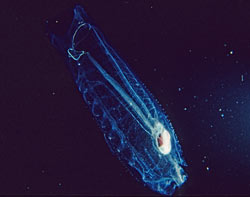
From Astrobiology Magazine
(based on a WHOI release)
Transparent jellyfish-like creatures known as salps, considered by many a low member in the ocean food web, may be more important to the fate of the greenhouse gas carbon dioxide in the ocean than previously thought.
In the May issue of Deep Sea Research, scientists report that salps, about the size of a human thumb, swarming by the billions in hot spots may be transporting tons of carbon per day from the ocean surface to the deep sea and keep it from re-entering the atmosphere. Salps are semi-transparent, barrel-shaped marine animals that move through the water by drawing water in the front end and propelling it out the rear in a sort of jet propulsion. The water passes over a mucus membrane that vacuums it clean of all edible material.
The oceans absorb excess carbon dioxide from the atmosphere, some from the burning of fossil fuels. In sunlit surface waters, tiny marine plants called phytoplankton use the carbon dioxide to grow. Animals then consume the phytoplankton and incorporate the carbon, but most of it dissolves back into the oceans when the animals defecate or die. The carbon can be used again by bacteria and plants, or can return to the atmosphere as heat-trapping carbon dioxide when it is consumed and respired by animals.
Biologists Laurence Madin of Woods Hole Oceanographic Institution (WHOI) and Patricia Kremer of the University of Connecticut and colleagues have conducted four summer expeditions to the Mid-Atlantic Bight region, between Cape Hatteras and Georges Bank in the North Atlantic, since 1975. Each time the researchers found that one particular salp species, Salpa aspera, multiplied into dense swarms that lasted for months.
One swarm covered 100,000 square kilometers (38,600 square miles) of the sea surface. The scientists estimated that the swarm consumed up to 74 percent of microscopic carbon-containing plants from the surface water per day, and their sinking fecal pellets transported up to 4,000 tons of carbon a day to deep water...
_____
While that is interesting and all - and certainly the Earth has balancing agents that people will never know about - these salps and similar things could not be considered to be the "solution" - or we wouldn't have the problem that we do - the temperatures wouldn't be rising as they are. It's interesting to know that without them - global warming would likely be worse.
No comments:
Post a Comment